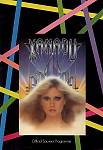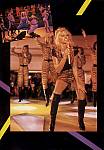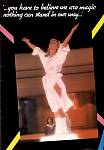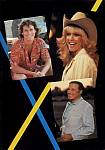The Xanadu programme was a rather nice item - they didn't seem to make enough of 'em since they had run out of them after a few days! Here's what it had to say:





Universal Presents A LAWRENCE GORDON Production
OLIVIA NEWTON-JOHN
GENE KELLY
Also starring
MICHAEL BECK
Written by
RICHARD CHRISTIAN DANUS and MARC REID RUBEL
Musical Scoring by
BARRY DeVORZON
Songs for Olivia Newton-John by John Farrar
Songs for Electric Light Orchestra by Jeff Lynne
Director of Photography
VICTOR J. KEMPER A.S.C.
Directed by
ROBERT GREENWALD
Executive Producer
LEE KRAMER
Co-Producer
JOEL SILVER
Produced by
LAWRENCE GORDON
The Production of XANADU
The Concept
Producer Lawrence Gordon describes the history of Xanadu : 'Joel Silver was an executive for me with the assignment of developing projects. He happens to be a real film buff, and he wanted to make an old-fashioned musical. We developed the story for Warner Brothers, who declined to go ahead. Maybe they were right to do so. A musical fantasy is chancy, and at that time we didn't have Olivia or Gene. Joel and I still believed in the project. We took it to Universal and they decided to do the film.'
Next came director Rober Greenwald. Gordon, having seen several movies for TV directed by Greenwald, admired his work. Although XANADU marks Greenwald's feature film debut, he has a very successful career with the stage as well as television.
The Casting
Olivia Newton-John's first American film, Grease, turned out to be the most successful film musical in history. Inevitably Olivia, already a superstar in the music world, was barraged with film scripts. She was in no hurry to do another film, however - until the right project came along.
Xanadu
When Gene Kelly agreed to be in the film, he told Gordon he wouldn't 'touch a toe'. He would be strictly a dramatic actor. Fortunately the trio were able to persuade the fabulous Kelly to dance in several of the production numbers.
One of the most colourful numbers was staged at Fiorucci's in Beverly Hills, with Kelly dancing his way through more than half a dozen costume changes. 'The man is not just an actor and dancer' says Greenwald, 'he is also a producer, director, choreographer, and wirter. It's not only a challenge to direct him on my first picture - it would be the same on my fiftieth picture!'
With Olivia and Kelly signed to star in XANADU, Gordon, Silver, Greenwald ad executive producer Lee Kramer had one major role left to cast, that of the romantic lead opposite Olivia. Lots of names came up, but the one everyone kept coming back to was Michael Beck, who had starred for Gorson in 'The Warriors'. It was felt by all that the chemistry between him and Olivia would be very exciting. Michael's solid acting training in England would add another dimension to a fantasy musical.
'...an everlasting world and you're here with me eternally...'
The Opticals
Rarely has there been a musical with so many dazzling special effects sequences. Wit till you see the muses spring to life from a wall painting to the lyrical strains of 'I'm Alive'. Responsible for the special effects and main title was Richard Greenburg who designed all these sequences. Although Greenburg was originally brought in only for the opening titles and promotion, Gordon, Silver, and Greenwald were so delighted with the Knock-you-out-of-your seat opticals that Greenburg eventually created more than 80 opticals and effects for XANADU.
The Set
Construction of the interior of XANADU, a streamlined modern palace, was begun early in September of 1979 on Stage 4 of Hollywood General Studios. It took three months to build the million-dollar oval-shaped set, which was the largest ever designed by John Corso.
The two-storey set measured 163 feet by 90 feet.
The company spent more than three weeks filming the XANADU finale. The basic colours used: burgundy and grey. Fountains surrounded the rotating platform below the stage. A curtain of mirrored panels rose and fell between the musical numbers. Two hundred and thrity-seven dancers, roller-skaters, and speciality acts worked in the sequence; including jugglers, thightrope walkers, boogaloo street dancers and adagio dancers.
The Costumes
For this most lavish of films, Olivia has a number of wonderful costume changes. She tap-dances, garbed in a 40's sunsuit with her hair in a Betty Grable-style. For a hot rock number she wears a tigerskin vest and a slit skirt. There's a hoedown country-western number with Oliva in a white fringed cowboy outfit. For the stunning showgirl number, Oliva glides up a ramp clothed in an elegant Erté-influenced gown.
The Music
The music for XANADU was created by Jeff Lynne, driving force behind Electric Light Orchestra, who wrote and performs five original songs - and by John Farrar, who wrote five additional songs for Olivia Newton-John. ELO recorded Lynne's songs for the soundtrack of XANADU.
The Dancing
Kenny Ortega and Jerry Trent each choreographed several spectacular musical numbers using some of Hollywood's most talented dancers.
The Battle of the Bands number contains some of the most exciting dance sequences in XANADU. The number expresses Kelly's and Beck's very different visualisations of XANADU.
Kelly fantasises XANADU in a 40's atmosphere with a swing band elegantly dressed in tuxedos. An Andrews sisters-like trio croons, and a wide assortment of dancers in 40's style clothing jutterbug their hearts out.
Beck sees XANADU as an 80's electrified rock group in electric-orange costumes. In fornt of the stage are a group of dancers dressed in neon-coloured jumpsuits and tights. The dance is outrageous hot rock.
The finale of the 40's-80's number sees the two stages, with the musicians and the dancers merging into one group for an unforgettable climax.
John Farrar
John Farrar, who has written five original songs for Xanadu, has been Olivia Newton-John's record producer since 1970. He has also written several hit songs for her, including the Academy Award-nominated Hopelessly Devoted To You and You're The One That I Want from Grease; Sam, Have You Never Been Mellow, and A Little More Love.
Australian-born, Farrar began playing the guitar at the age of 12. By the time he was 19, he and his group had become the house band on The Go Show, Melbourne's version of American Bandstand. They provided the backing and arranging for various guest artists who needed it each week, including Olivia and the Bee Gees. Thus, Olivia and John first became acquainted.
Pat Carroll, John's wife of ten years, sang regularly on The Go Show, and before their marriage in 1970, had toured England with Olivia Newton-John for two years as "Pat and Olivia". In September 1970, John and Pat moved to England.
The popular British recording group, the Shadows, was reorganising. John joined two former members of that group; their trio became known as Marvin. Welch and Farrar. John co-produced the group's first album.
John and Bruce Welch also co-produced Olivia. Their first single a Bob Dylan tune If Not For You, was a hit both in Britain and the United States in 1971. Their next single Banks Of The Ohio won an English silver disc and an Australian Gold Disc. When their first album Let Me Be There was released in the States in 1973, it was certified platinum, and the single of the same name went gold.
John started producing Olivia Newton-John on his own in 1972, and had great success in England, Europe and Australia with What Is Life? and Take Me Home Country Roads. Olivia's next American release, If You Love Me, Let Me Know, was certified double platinum, and the single of the same name and I Honestly Love You both went gold. Farrar was awarded a Grammy as the producer of I Honestly Love You.
The successes continued. The albums Have You Never Been Mellow and the Grease soundtrack each went multi-platinum. Certified platinum were the albums Clearly Love, Come On Over, Olivia Newton-John's Greatest Hits and Totally Hot, along with singles You're the One That I Want and Hopelessly Devoted To You (both written by John). And reaching gold status was the Don't Stop Believin' album as well as the singles Have You Never Been Mellow, Please Mr Please and A Little More Love (also written by John).
Farrar moved to Los Angeles in 1977, after having toured in the States with Olivia the previous year. Apart from writing and producing five original songs for Xanadu - Kira's theme, Suddenly, Dancin', Suspended in Time and Whenever You're Away From Me, and some incidental music for the film - he has been writing and producing his own solo album as a songwriter/performer.
John, who lives in Los Angeles with his wife Pat and baby son, Sam, is becoming more and more interested in the film world which he finds exciting and challenging. A goal for the future is to write an original musical for the screen - the book, music and lyrics.
There was also a Japanese movie program printed - see it here